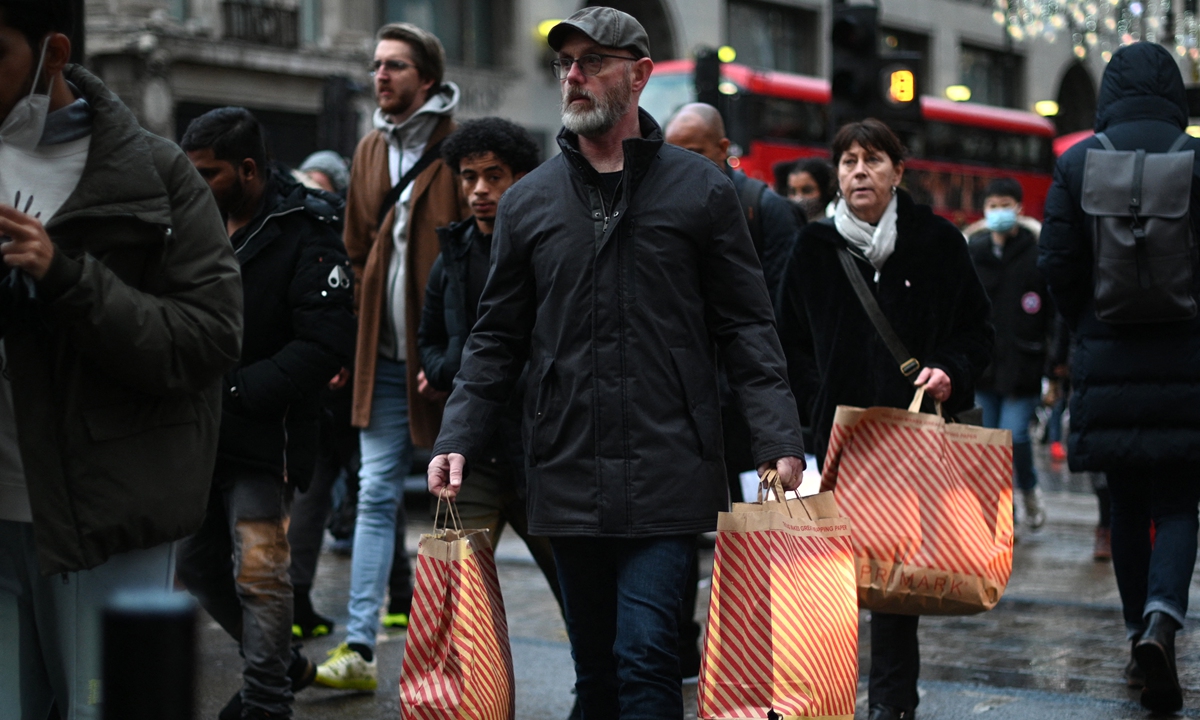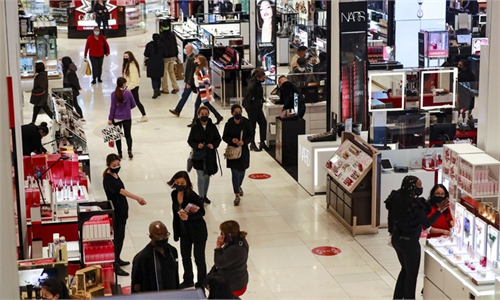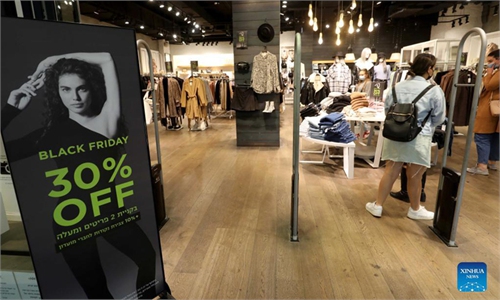Beyond one’s means
Black Friday fuels debt fears as Britons go on ‘buy now, pay later’ spree

Shoppers make their way along Oxford Street on Black Friday, in central London on November 26, 2021. Photo: AFP
As British shoppers gear up for a multibillion pound Black Friday and Christmas splurge, lawmakers have called for urgent regulation of "buy now, pay later" (BNPL) fintech services, which they say lead many people to spend beyond their means.Britain has seen an explosion of online platforms such as Klarna, Clearpay and Laybuy, which let consumers buy goods interest free and spread out payments.
"I'm really worried how many people will get into debt this Christmas as these companies push them to spend more than they can afford," parliamentarian Stella Creasy told the Thomson Reuters Foundation, accusing lenders of "predatory" behavior.
Black Friday kicks off the Christmas shopping season when retailers offer big discounts on everything from toys to TVs.
Almost 10 percent of Britons are planning to use "buy now, pay later" options for Christmas shopping, according to consumer charity Citizens Advice.
But Creasy said the combination of Black Friday promotions and "pay later" platforms was "like pouring petrol on fire," especially for those struggling financially due to the pandemic.
She warned that people risked amassing unmanageable debts as retailers encourage them to go all out for Christmas following the axing of 2020's celebrations due to soaring COVID-19 cases.
Lawmakers, who debated the issue in parliament this week, urged the government to publicize the risks of the borrowing mechanism ahead of the festive season.
Critics say the platforms risk normalizing and glamorizing debt - charges strongly refuted by Klarna and other lenders.
A Klarna spokesperson said consumers were switching to BNPL because credit cards charged extortionate interest rates and used "dirty tricks" to trap people in debt.
'Significant harm'
'Buy now, pay later' is also booming in other countries including the US, Australia and elsewhere in Europe, partly spurred by the increase in online shopping during the pandemic.
In Britain, transactions more than trebled during 2020 to a value of 2.7 billion pounds ($3.6 billion).
But Citizens Advice has likened BNPL borrowing to "quicksand" - easy to slip into and very hard to get out of.
One in 10 users - and one in eight younger users - were chased by debt collectors in 2020, the charity said in a recent report.
Shoppers were charged 39 million pounds in late fees during that time, with more than half of young users struggling to make a repayment, it added.
The government has said it will regulate the sector after an independent review published in February warned it posed "significant potential consumer harm."
The Treasury launched a consultation in October which closes in January, but campaigners fear regulation could take another year.
They accused the government of responding too slowly to a fundamental shift in how people are managing their money.
Rather than charge users interest, payment platforms take fees from retailers.
Opposition Labour MP Creasy said shoppers' spending increased 20 percent-30 percent when they used pay later options, making them popular with retailers.
But financial campaigner Alice Tapper, who has spearheaded calls for regulation, said the platforms did not spell out to users that they were providing credit, and that late payments could attract charges and the use of debt collectors.
Nor did lenders run full credit checks or know how many other platforms a customer had debts with, she said.
In testimonies gathered by Tapper, users said the lack of financial health warnings and promotions by social media influencers made it seem like "free money."
One 23-year-old ended up with a debt of 12,500 pounds as she tried to keep up appearances on social media with designer purchases.
Tapper said the lack of regulation meant people could not go to the financial ombudsman if disputes arose.
Swedish fintech giant Klarna, New Zealand's Laybuy and Clearpay said they supported regulation, encouraged responsible shopping and made clear the consequences of late payment.
Klarna and Laybuy said they carried out credit checks. Clearpay said it had other protections to stop people falling into debt.
'Glamorizing debt'
Lawmakers also flagged concerns that some retailers had made BNPL platforms the default payment method on their websites - something Sweden has outlawed.
Citizens Advice cited the case of a woman in her 60s who was threatened with debt collectors after unwittingly clicking on a provider's link while buying plants.
Critics also highlighted concerns over aggressive marketing targeting the under-30s, and moves by some retailers to offer discounts conditional on a shopper using a BNPL lender.
"The way these products are presented as risk-free, harmless - almost fun - is a worry," Tapper said. "They risk glamorizing debt."
Britain's advertising watchdog banned several Klarna advertisements in 2020 for suggesting people could use credit to boost their mood if they were struggling during the pandemic.
Tapper said the sector appeared to have become more responsible since talk of regulation, although it still had a long way to go.
She said the "buy now, pay later" model was not inherently bad, and could be valuable if used well.
"There is the potential for [it] to be a brilliant financial inclusion tool for people who would otherwise by stung by huge interest rates," she added.
Reuters



